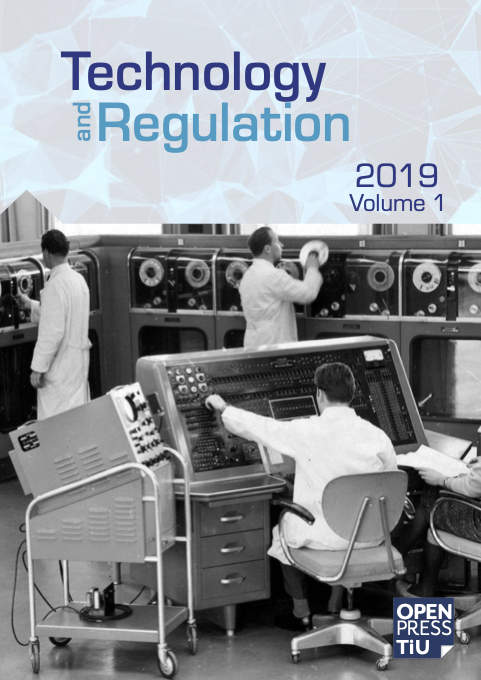Vol. 2019 (2019)
Full Issue
Articles
-
Of Horses and Other Animals of Cyberspace Editorial
In this introductory article to the new journal Technology and Regulation, I give a somewhat personal account of the history of cyberlaw and technology law and the ‘struggles’ some scholars have finding their spot in the more general legal realm. It will recount some of the classic discussions in the field, such as whether cyberlaw is just a form of the ‘Law of the Horse’. It also outlines the contours of the field of technology regulation, some of the open questions in defining this field and some of its constituent elements. Finally, questions that I hope will be addressed in future articles in the journal are provided.
-
Law Disrupted, Law Re-Imagined, Law Re-Invented
This article describes the technological disruption of law and legal reasoning, suggests how law might be re-imagined, and then proposes four key elements in the re-invention of law. Two waves of disruption are identified. One wave impacts on the content of legal rules and the way in which we perceive the deficiency of those rules. A second wave impacts on our appreciation of technological instruments as tools to be used for regulatory purposes in support of, or even in place of, legal rules. The suggested re-imagination of law centres on the idea of the regulatory environment, broadly conceived to include both normative and non-normative signals. The proposed re-invention of law has four strands. It starts with (i) a fresh understanding of the range of regulatory responsibilities. This understanding then shapes (ii) the articulation of the Rule of Law and it informs both (iii) a renewal of traditional coherentist thinking and (iv) a reshaping of legal and regulatory institutions.
-
Artificial Intelligence: Some ethical issues and regulatory challenges
This article offers a brief overview of some of the ethical challenges raised by artificial intelligence (AI), in particular machine learning and data science, and summarizes and discusses a number of challenges for near-future regulation in this area. This includes the difficulties of moving from principles to more concrete measures and problems with implementing ethics by design and responsible innovation.
-
Legality and Democratic Deliberation in Black Box Policing
The injection of emerging technologies into policing implies that policing mandates in law may become mediated and applied through opaque machine learning algorithms, artificial intelligence, or surveillance tools – contributing to a form of ‘black box policing’ challenging foreseeability and clarity and expanding discretionary legal spaces. In this paper, this issue is explored from a constitutional and rule of law perspective, using the requirements of qualitative legality elaborated by the European Court of Human Rights and the implicit democratic values that they serve. Placing this concept of legality into a wider theoretical framework allows legality to be translated into a context of emerging technology to maintain the connections between rule of law, democracy, and individual autonomy.



